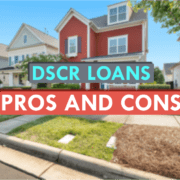The Pros and Cons of a DSCR Loan
Every loan in the world has its pros and cons – DSCR loans are no exception. The important thing is to be able to evaluate whether it’s right for your property.
DSCR Loan Pros
No Income Requirements
The biggest advantage to a DSCR Loan is that there are no income requirements.
You don’t have to work a W2 job, or be self-employed for 2 years. The application won’t ask where you work or what you do.
This is helpful if you’ve just started a new job, become recently unemployed, or have more unconventional income.
The number one requirement for a DSCR loan is the income from the property itself.
Business-Friendly Financing
DSCRs are considered business loans since the properties are non-owner-occupied. The majority of them allow you to finance in an LLC or other business name.
They also do loans in different states. If you have properties in Colorado and Florida, you can go to one lender and they can lend both places.
Minimal Paperwork
If you’ve ever done a traditional loan, you know the paperwork is a giant hassle. DSCR loans have very minimal paperwork. They’ll need to look at your:
- Credit score
- Loan-to-value
- Rent
And that’s it.
The majority of lenders won’t ask for info on your other properties. They just want to know the other properties are current, and that shows up on your credit report. Even if you have other rental properties with negative cash flow, it won’t impact your ability to get a DSCR loan on a positive cash-flowing one.
As long as you have a property that’s making money, you can get this loan for very little paperwork.
DSCR Loan Cons
Prepayment Penalties
DSCR loans almost always come with pre-pay penalties. You have to keep the loan for a minimum timeframe of around 3-5 years to avoid a fee for paying off early.
So, if you get a DSCR loan, then a year later you find someone who wants to buy, or some other unexpected event comes up and you have to sell the property… You’re stuck paying to get out.
And prepayment penalties can be up to 5% of the loan amount.
Let’s say you have a $200,000 loan with a 5 year pre-pay minimum. And you end up wanting to sell it after 2 years. Then you’ll have to pay the lender 5% of $200,000 – or $10,000 – just to get out of the loan.
Higher Rates Than Other Conventional Loans
Some DSCR loans have 5, 7, or 10-year ARMs that keep rates down. Still, DSCR interest rates will be 1.25 to 1.5 points higher than other conventional loans.
This will impact your cash flow, so a property has to have a strong cash flow for you to consider a DSCR loan.
Pros vs Cons: Are DSCR Loans Worth It?
Despite their drawbacks, DSCR loans can be a truly great option.
It’s a great portfolio loan for real estate investors. DSCR is perfect for people who want something easy, or who don’t have the income traditional loans need.
As long as your specific property fits the criteria and the cash flow is there, a DSCR is a great easy loan to build your portfolio without the hassle of underwriting.
Read the full article here.
Watch the full video here:

